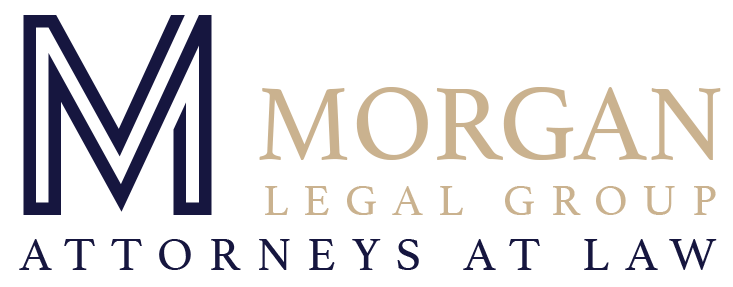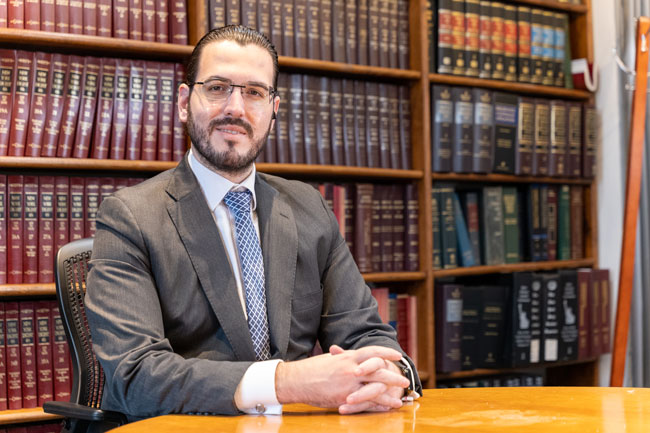Destacado abogado de planificación de bienes y sucesiones de Nueva York.
CEO & Founder of Morgan Legal Group

Schedule Your Consultation







Morgan Legal Group es una firma respetada en la industria legal, dedicada a la excelencia en Planificación Patrimonial, Derecho de Sucesiones, Derecho de Familia, entre otros. Con una pasión arraigada por ayudar a nuestros clientes a asegurar su futuro y proteger su legado, nuestro equipo de abogados experimentados combina su expertise con un enfoque personalizado. Estamos comprometidos a hacer que el proceso legal sea accesible, comprensible y adaptado a sus necesidades únicas. Descubra la tranquilidad que viene de asociarse con Morgan Legal Group.
En Morgan Legal Group, nuestro enfoque está personalizado para satisfacer las necesidades y solicitudes específicas de cada cliente. Nuestro equipo de profesionales capacitados puede manejar asuntos legales complejos y se enorgullece de proporcionar un servicio personalizado de calidad. Además, a diferencia de muchos grandes bufetes de abogados de producción en masa, el cliente tiene la oportunidad de hablar con un abogado siempre que tenga una pregunta.
Nuestra fortaleza es nuestra capacidad de trabajar mano a mano con nuestros clientes y lograr nuestros objetivos comunes juntos en un entorno dinámico, ya sea que sus necesidades sean urgentes.
Nuestro equipo se enorgullece de devolver todas las llamadas telefónicas, correos electrónicos y otras consultas de cada uno de nuestros clientes de manera pronta, ya sea el mismo día o en el momento que el cliente lo solicite.
Especialización y Experiencia:
En Morgan Legal Group, nos especializamos en planificación patrimonial, destacando la profundidad de conocimientos y experiencia que poseen nuestros abogados en esta área específica del derecho. Nuestros clientes buscan expertos capaces de ofrecer soluciones a medida para sus necesidades de planificación patrimonial. Nuestro equipo cuenta con certificaciones y formación avanzada en planificación patrimonial, lo que aumenta la confianza de nuestros clientes en nuestra capacidad para asesorar y guiar en la gestión y protección de su legado.
Enfoque integral:
En Morgan Legal Group adoptamos un enfoque integral en la planificación patrimonial. Ofrecemos diversos servicios, como la elaboración de testamentos, creación de fideicomisos, poderes notariales y directivas de atención médica. Informamos a nuestros clientes que nuestra firma puede atender la totalidad de sus necesidades de planificación patrimonial bajo un mismo techo, asegurando que todos los aspectos de sus deseos financieros y de salud sean tenidos en cuenta.
Preservación del legado y protección de activos:
En Morgan Legal Group, nos centramos en preservar y proteger el legado y los activos de nuestros clientes. Explicamos las estrategias y herramientas que nuestra firma utiliza para ayudar a los clientes a minimizar los impuestos sobre herencias, evitar el proceso de sucesión testamentaria y garantizar una transición fluida de los activos a los beneficiarios. Compartimos historias de éxito y casos de estudio que demuestran la capacidad de nuestra firma para ayudar a los clientes a salvaguardar su riqueza y proveer para las futuras generaciones.
Sobre nosotros
Testimonios de Clientes
Más de 300 reseñas de 5 estrellas
with my entire estate plan because I genuinely believe that he is someone I can truly rely on
What really sets Russel apart is his commitment to prioritize his clients best interests, which is a rare quality in today’s market.
I’m excited to continue working with Mr. Morgan in the years
Several months later my adult nephew tragically passed away from natural causes, leaving behind his children. During this challenging time, Mr. Morgan made himself available to offer guidance and support as I assisted my brother through the process. I highly recommend Morgan Legal Group for their expertise in trust, probate, and estate planning.
Reconocimiento






Por qué elegirnos
Especialización y Experiencia:
En Morgan Legal Group, nos especializamos en planificación patrimonial, destacando la profundidad de conocimientos y experiencia que poseen nuestros abogados en esta área específica del derecho. Nuestros clientes buscan expertos capaces de ofrecer soluciones a medida para sus necesidades de planificación patrimonial. Nuestro equipo cuenta con certificaciones y formación avanzada en planificación patrimonial, lo que aumenta la confianza de nuestros clientes en nuestra capacidad para asesorar y guiar en la gestión y protección de su legado.
Enfoque integral:
En Morgan Legal Group adoptamos un enfoque integral en la planificación patrimonial. Ofrecemos diversos servicios, como la elaboración de testamentos, creación de fideicomisos, poderes notariales y directivas de atención médica. Informamos a nuestros clientes que nuestra firma puede atender la totalidad de sus necesidades de planificación patrimonial bajo un mismo techo, asegurando que todos los aspectos de sus deseos financieros y de salud sean tenidos en cuenta.
Preservación del legado y protección de activos:
En Morgan Legal Group, nos centramos en preservar y proteger el legado y los activos de nuestros clientes. Explicamos las estrategias y herramientas que nuestra firma utiliza para ayudar a los clientes a minimizar los impuestos sobre herencias, evitar el proceso de sucesión testamentaria y garantizar una transición fluida de los activos a los beneficiarios. Compartimos historias de éxito y casos de estudio que demuestran la capacidad de nuestra firma para ayudar a los clientes a salvaguardar su riqueza y proveer para las futuras generaciones.
Usted se merece uno de nuestros abogados destacados en Nueva York
Preguntas y Respuestas
La planificación patrimonial típicamente involucra los siguientes elementos:
Testamento o Fideicomiso:
Un testamento es un documento legal que especifica cómo se deben distribuir los activos de una persona después de su muerte. Los fideicomisos, por otro lado, son entidades legales que mantienen y gestionan activos en beneficio de los beneficiarios según los términos establecidos por el creador del fideicomiso. Los testamentos y fideicomisos son componentes fundamentales de la planificación patrimonial.Poder Notarial:
Un documento de poder notarial nombra a un individuo de confianza (conocido como agente o apoderado) para tomar decisiones financieras y legales en nombre de la persona que crea el documento. Esto es crucial para situaciones en las que el individuo se incapacita o no puede gestionar sus asuntos.Proxy de Salud o Directiva Anticipada:
Estos documentos nombran a alguien para tomar decisiones médicas en nombre del individuo en caso de que no puedan hacerlo. También pueden delinear las preferencias de tratamiento médico y cuidados al final de la vida del individuo.Designaciones de Beneficiarios:
En la planificación patrimonial, las personas pueden designar beneficiarios para sus cuentas de jubilación, pólizas de seguro de vida y otros activos financieros. Estas designaciones especifican quién recibirá los activos tras la muerte, evitando el proceso de probate.Planificación Fiscal:
La planificación patrimonial a menudo implica estrategias para minimizar los impuestos sobre herencias y maximizar la transferencia de activos a los beneficiarios. Esto puede incluir el uso de fideicomisos, métodos de donación y otras técnicas de planificación fiscal eficientes.Designaciones de Tutela:
Para individuos con hijos menores, la planificación patrimonial permite la designación de un tutor para cuidar y tomar decisiones en nombre de los niños si ambos padres fallecen.Conclusión
La planificación patrimonial es un proceso altamente personalizado que considera las circunstancias únicas del individuo, la dinámica familiar y los objetivos financieros. Por lo tanto, es esencial consultar con un abogado o profesional experimentado en planificación patrimonial para crear un plan integral que se alinee con sus necesidades específicas y asegure que sus deseos se lleven a cabo de manera efectiva.La planificación patrimonial cumple varios propósitos importantes:
Distribución de Activos:
La planificación patrimonial te permite determinar cómo se distribuirán tus activos, incluyendo propiedades, inversiones, cuentas bancarias y pertenencias personales, entre tus beneficiarios o herederos elegidos. Proporciona un marco legal para especificar quién recibirá qué y en qué proporciones, evitando posibles disputas e incertidumbre entre los miembros de la familia.Minimizar Impuestos y Gastos:
A través de la planificación patrimonial, puedes implementar estrategias para minimizar los impuestos sobre la herencia, impuestos sobre donaciones y otros costos potenciales asociados con la transferencia de activos. Una planificación fiscal adecuada puede ayudar a preservar más de tus activos para tus beneficiarios y reducir la carga financiera sobre tu patrimonio.Proteger a los Seres Queridos:
La planificación patrimonial te permite proveer para el bienestar financiero y cuidado de tus seres queridos, incluyendo hijos menores, familiares mayores o discapacitados, o individuos con necesidades especiales. Por ejemplo, puedes designar tutores para menores, crear fideicomisos para gestionar y proteger activos para los beneficiarios y establecer provisiones para decisiones de atención médica y cuidado al final de la vida.Evitar el Probate y Mantener la Privacidad:
Un plan de patrimonio bien elaborado puede ayudar a tus seres queridos a evitar o agilizar el proceso de probate, reduciendo el tiempo, los costos y las complejidades asociadas con los procedimientos de probate supervisados por el tribunal. Además, herramientas específicas de planificación patrimonial, como los fideicomisos, pueden ayudar a mantener la privacidad al mantener los detalles de la distribución de tus activos fuera de los registros públicos.Planificación de Sucesión de Negocios:
Si eres dueño de un negocio, la planificación patrimonial permite una transición y sucesión fluida de tus intereses comerciales. Puedes designar sucesores, crear un plan para la gestión o venta del negocio y minimizar las interrupciones en sus operaciones.Planificación para la Incapacidad:
La planificación patrimonial implica prepararse para la incapacidad o discapacidad durante tu vida. A través de documentos como poderes notariales y directivas de atención médica, puedes nombrar a personas de confianza para tomar decisiones financieras y médicas en tu nombre si no puedes hacerlo.Objetivos Filantrópicos:
La planificación patrimonial también puede incluir donaciones benéficas y apoyo a causas que son importantes para ti. Al tener legados benéficos o crear fundaciones o fideicomisos benéficos, puedes dejar un impacto duradero y apoyar a las organizaciones o causas que te interesan.Conclusión
Al involucrarte en la planificación patrimonial, puedes tener la tranquilidad de saber que tus activos se distribuirán según tus deseos, tus seres queridos estarán provistos y se minimizarán las complejidades y conflictos potenciales. Es recomendable consultar con un abogado o profesional experimentado en planificación patrimonial para asegurarte de que tu plan de patrimonio esté adaptado a tus objetivos y circunstancias específicas.It depends on your needs, objectives, and goals. Both a Will and a Trust Agreement are estate planning tools, but they serve different purposes. If they can work together or refer to one another in a logic of general estate planning, a Will and a Trust agreement remain very separate documents with significant differences.
The most apparent difference between a Trust and a Will is that a trust is effective upon its duly execution, as the grantor is alive. At the same time, the last will has effect only upon a testator’s death and proper probate proceeding.
If an individual dies without a Will, their property has to be distributed and passed as per the state’s laws of intestacy where the decedent was permanently residing before his death. For example, in New York State, if a decedent who died without a Will had a spouse and children, the spouse will be entitled to a portion of the decedent’s estate. Under such circumstances, the spouse will receive $50,000 in assets and half of the estate, while the decedent’s children will get the other half to be divided among them. If the decedent had a spouse but no children, the spouse will be entitled to the entirety of the estate.
If the decedent had no living children or spouse, his estate will pass to his grandchildren. Absent grandchildren, the decedent’s estate will be distributed to his parents. If the decedent’s parents are not alive, the decedent’s property will pass to the decedent’s siblings or their children…etc.
The cost of estate planning can vary based on your needs, objectives, financial situation, and attorney’s expertise. Therefore, your attorney needs to evaluate these factors before setting a price for the drafting and execution your Estate Planning documents.
Attorneys at Morgan Legal Group P.C. offer a free initial consultation to precisely assess your needs and discuss the cost of your Estate Planning.
If set and drafted correctly, a trust instrument offers several advantages by an experienced and specialized attorney. For example, a trust enables you to decide how your assets will be distributed before or after your death; it allows you to significantly and legally reduce applicable taxes such as gift taxes. In addition, it will enable you to protect your assets generally and let you name a person of trust (a fiduciary or trustee) who will manage your investments for you and under the directions set in your faith.
In other words, having a Trust can benefit you in many different yet effective ways.
El proceso de sucesión suele incluir los siguientes pasos:
Presentación de la petición:
El proceso comienza con la presentación de una petición ante el tribunal de sucesiones en la jurisdicción donde residía la persona fallecida al momento de su muerte. La petición busca abrir los procedimientos de sucesión y nombrar un ejecutor o representante personal para supervisar el patrimonio.Notificación a las partes interesadas:
Se notifica a todos los beneficiarios nombrados en el testamento, así como a cualquier acreedor u otras partes interesadas que puedan tener una reclamación contra el patrimonio.Validación del testamento:
Si hay un testamento, el tribunal examina su validez. Esto incluye confirmar que cumple con los requisitos legales, como estar debidamente firmado y presenciado. Si el testamento es considerado válido, se acepta para la sucesión.Inventario y tasación:
El ejecutor o representante personal identifica y cataloga todos los activos y deudas del patrimonio de la persona fallecida. Esto puede implicar obtener tasaciones de ciertos activos para determinar su valor.Liquidación de deudas:
Las deudas e impuestos del patrimonio se pagan utilizando los activos del mismo. Esto incluye saldar facturas pendientes, notificar a los acreedores y atender cualquier reclamación válida contra el patrimonio.Distribución de activos:
Una vez saldadas las deudas e impuestos, los activos restantes se distribuyen a los beneficiarios según lo establecido en el testamento o determinado por las leyes de intestancia.Cierre del patrimonio:
Después de completar todos los pasos necesarios, incluyendo la presentación de los informes y declaraciones de impuestos requeridos, el tribunal de sucesiones aprueba la distribución final de activos y cierra oficialmente el patrimonio.Conclusión
Es importante señalar que las leyes y procedimientos de sucesión pueden variar de una jurisdicción a otra. Algunas jurisdicciones han simplificado o agilizado los procesos de sucesión para patrimonios pequeños o ofrecen alternativas al proceso tradicional de sucesión, como “declaraciones juradas para patrimonios pequeños” o designaciones de “transferencia a la muerte”. Consultar con un abogado especializado en derecho de sucesiones puede proporcionar orientación específica basada en las leyes aplicables en tu jurisdicción.The purpose of the probate proceeding is to obtain a Court’s confirmation that the decedent’s Will is valid, properly executed, and attests that the decedent was competent when making their decisions to distribute their property to designated individuals.
As well as establishing the validity of the Will, a probate proceeding will confirm that the nominated executor is authorized to act as the executor of the estate.
Yes, absolutely! Probate would be a required and mandatory step if the decedent executed a Will before their death. If there is a Will, there will necessarily be a probate proceeding before the Surrogate’s Court even if the Will is not contested or appears unambiguous on its face and sets clear directives. The named Executor is immediately ready and available to follow.
Whether your Will is poorly drafted and extracted from an internet website or whether a brilliant attorney drafts it, it will necessarily be subject to a probate proceeding!
It depends on your needs, objectives, and goals. Both a Will and a Trust Agreement are estate planning tools, but they serve different purposes. If they can work together or refer to one another in a logic of general estate planning, a Will and a Trust agreement remain very separate documents with significant differences.
The most apparent difference between a Trust and a Will is that a trust is effective upon its duly execution, as the grantor is alive. At the same time, a last will have effect only upon a testator’s death and proper probate proceeding.
It is essential to understand that a Will and a Trust are two distinct, separate legal documents with different objectives and purposes. However, they can be part of the same Estate Plan and functional together. Many of our clients ask us whether a Trust overrides a Will. Our simple answer is that Trust (specifically a revocable trust) is established during the settlor’s lifetime and is effective immediately upon its execution by the settlor. Trusts are effective before the decedent’s death, while a Will is only effective upon the decedent’s death. Thus, the Trust precedes when there is a conflict between a Will and a Trust.
A particular type of will called a “Pour-over Will” works simultaneously with a Trust instrument which refers to it. When the grantor who created the Trust failed or omitted to transfer some of their property to the Trust as they should have, a Pour-over Will gifts the remaining property specifically to the Trust, covering all estate assets in the Trust.
This type of Estate Planning can be of great utility.
The cost of estate planning in NYC can vary depending on several factors, including the complexity of your estate, the specific services you require, and the attorney or firm you choose to work with. In addition, depending on the attorney’s experience and expertise, estate planning costs can also vary.
Generally, estate planning services can range from a few hundred dollars to several thousand dollars in NYC. Simple estate planning documents, such as an essential will, power of attorney, and healthcare proxy, may cost on the lower end of the spectrum. However, the cost is likely to be higher if your estate is more complex and requires additional planning, such as trusts, tax planning, or business succession planning.
It’s essential to consult with several estate planning attorneys in NYC to obtain estimates and discuss their fee structures. For example, some attorneys charge a flat fee for estate planning services, while others may bill hourly. During your consultation, inquire about additional costs, such as filing fees or expenses related to executing the estate plan.
Remember that estate planning is an investment in the protection of your assets and the well-being of your loved ones. Therefore, it’s crucial to prioritize finding an experienced and reputable attorney who can provide quality guidance and ensure that your estate plan meets your needs and goals.
About Us
Morgan Legal Group is a trusted name in the legal industry, committed to excellence in Estate Planning, Probate, Family Law, and more. With a deep-rooted passion for helping our clients secure their futures and protect their legacies, our team of experienced attorneys combines expertise with a personalized approach. We’re dedicated to making the legal process accessible, understandable, and tailored to your unique needs. Discover the peace of mind that comes from partnering with Morgan Legal Group.
Your Trusted Estate Planning Partner in New York

CEO & Founder of Morgan Legal Group

Recognition





Schedule Your Consultation
Questions And Answers
The cost of estate planning in NYC can vary depending on several factors, including the complexity of your estate, the specific services you require, and the attorney or firm you choose to work with. In addition, depending on the attorney’s experience and expertise, estate planning costs can also vary.
Generally, estate planning services can range from a few hundred dollars to several thousand dollars in NYC. Simple estate planning documents, such as an essential will, power of attorney, and healthcare proxy, may cost on the lower end of the spectrum. However, the cost is likely to be higher if your estate is more complex and requires additional planning, such as trusts, tax planning, or business succession planning.
It’s essential to consult with several estate planning attorneys in NYC to obtain estimates and discuss their fee structures. For example, some attorneys charge a flat fee for estate planning services, while others may bill hourly. During your consultation, inquire about additional costs, such as filing fees or expenses related to executing the estate plan.
Remember that estate planning is an investment in the protection of your assets and the well-being of your loved ones. Therefore, it’s crucial to prioritize finding an experienced and reputable attorney who can provide quality guidance and ensure that your estate plan meets your needs and goals.
Probate is the legal process through which a deceased person’s estate is administered and distributed to their beneficiaries or heirs. It is a court-supervised procedure that validates and executes the instructions outlined in the deceased person’s will (if there is one) or determines the distribution of assets according to intestacy laws (when there is no will).
The primary goals of probate are to ensure the proper management of the deceased person’s estate, pay any outstanding debts or taxes owed by the estate, and ultimately transfer the assets to the rightful beneficiaries.
The probate process typically involves the following steps:
Filing the petition:
The process begins by filing a petition with the probate court in the jurisdiction where the deceased person resided at the time of their death. The petition seeks to open the probate proceedings and appoint an executor or personal representative to oversee the estate.
Notifying interested parties:
Notice is given to all beneficiaries named in the will, as well as to any creditors or other interested parties who may have a claim against the estate.
Validating the will:
If there is a will, the court examines its validity. This includes confirming that it meets the legal requirements, such as being properly signed and witnessed. If the will is deemed valid, it is accepted for probate.
Inventory and appraisal:
The executor or personal representative identifies and catalogs all the assets and debts of the deceased person’s estate. This may involve obtaining appraisals of certain assets to determine their value.
Debt settlement:
The estate’s debts and taxes are paid using the assets of the estate. This includes settling outstanding bills, notifying creditors, and addressing any valid claims against the estate.
Asset distribution:
Once the debts and taxes are settled, the remaining assets are distributed to the beneficiaries as outlined in the will or determined by the laws of intestacy.
Closing the estate:
After all the necessary steps have been completed, including filing the required reports and tax returns, the probate court approves the final distribution of assets and officially closes the estate.
Conclusion
It’s important to note that probate laws and procedures can vary from jurisdiction to jurisdiction. Some jurisdictions have simplified or streamlined probate processes for small estates or offer alternatives to traditional probate, such as “small estate affidavits” or “transfer-on-death” designations. Consulting with an attorney who specializes in probate law can provide specific guidance based on the laws applicable in your jurisdiction.
It depends on your needs, objectives, and goals. Both a Will and a Trust Agreement are estate planning tools, but they serve different purposes. If they can work together or refer to one another in a logic of general estate planning, a Will and a Trust agreement remain very separate documents with significant differences.
The most apparent difference between a Trust and a Will is that a trust is effective upon its duly execution, as the grantor is alive. At the same time, a last will have effect only upon a testator’s death and proper probate proceeding.










